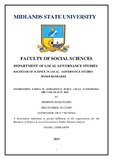Please use this identifier to cite or link to this item:
https://cris.library.msu.ac.zw//handle/11408/3505Full metadata record
| DC Field | Value | Language |
|---|---|---|
| dc.contributor.author | Marongere, Herbson | - |
| dc.date.accessioned | 2019-04-01T09:17:11Z | - |
| dc.date.available | 2019-04-01T09:17:11Z | - |
| dc.date.issued | 2015 | - |
| dc.identifier.uri | http://hdl.handle.net/11408/3505 | - |
| dc.description.abstract | The research seeks to explore the aspect of entrenching ethics in Zimbabwean Rural Local Authorities. The research study was influenced by a high rise of corruption and related unethical practices within the Local Government system which are greatly militating against the provision of efficient and effective service delivery. The research sought to identify; the unethical practices prevalent at Gutu Rural District Council (GRDC), to analyse the measures put in place to enforce ethical behaviour at GRDC, to analyse accountability and transparency mechanisms in place at Gutu RDC and also analysis of how the political, social and economic environment impact on the practice of ethics at GRDC. The research used descriptive research design and employed a mixed method that is combining both qualitative and quantitative research methods. Study population was 211 and a sample size of 33 participants. Sampling techniques used were purposive/judgemental and random sampling. In purposive sampling participants were selected judgementally basing on experience and expertise in the study area and random sampling the names of the participants were shuffled and then picked randomly. Sources of data include secondary source that is desk research study, GRDC documents such as minutes of meetings, circulars. Primary data was gathered through questionnaires and interviews. Major research findings were that unethical practices prevalent at GRDC include bribery, nepotism, and embezzlement, absenteeism, late reporting for duty, conflict of interest and abuse of council resources. Measures put in place to enforce good ethical conduct include a workable code of ethics/conduct, ethics training, conducive conditions of service and Human Resource (HR) Policies, circulars and directives from the Ministry of Local Government Public Works and National Housing, monthly reports as well as accountability and transparency mechanisms. Conclusions were that unethical practices prevalent at GRDC include bribery, nepotism, embezzlement, conflict of interest, absenteeism, reporting late for duty and patronage. Measures in place to enforce ethical behaviour at GRDC include a code of ethics/conduct which is however outdated. Recommendations were that council should establish a workable code of ethics/conduct, conduct ethics training, promote anti-corruption education/campaigns, pay employees in time and ensure accountability and transparency mechanisms are upheld. | en_US |
| dc.publisher | Midlands State University | en_US |
| dc.subject | Ethics | en_US |
| dc.subject | Zimbabwean rural local authorities | en_US |
| dc.title | Entrenching ethics in Zimbabwean rural local authorities: the case of Gutu RDC | en_US |
| item.fulltext | With Fulltext | - |
| item.grantfulltext | open | - |
| Appears in Collections: | Bsc Local Governance Studies Honours Degree | |
Files in This Item:
| File | Description | Size | Format | |
|---|---|---|---|---|
| LGS DISSERTATION 2015 FINAL HM FINAL DOC.pdf | Full Text | 1.2 MB | Adobe PDF |  View/Open |
Page view(s)
356
checked on Feb 14, 2026
Download(s)
280
checked on Feb 14, 2026
Google ScholarTM
Check
Items in MSUIR are protected by copyright, with all rights reserved, unless otherwise indicated.



